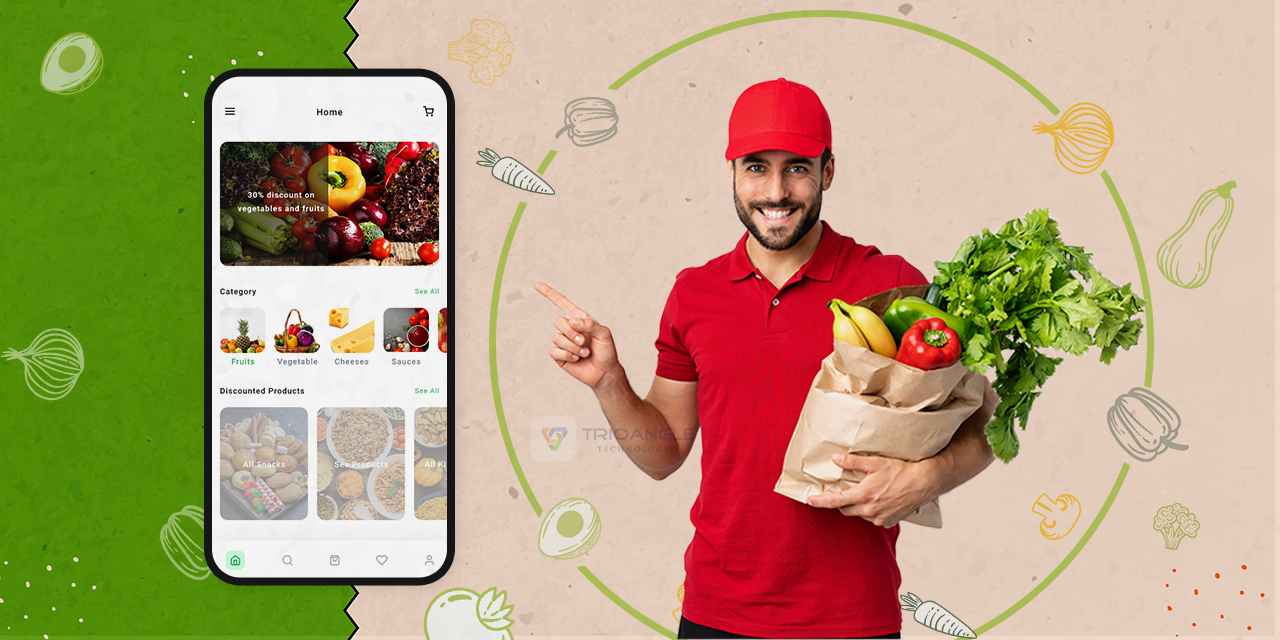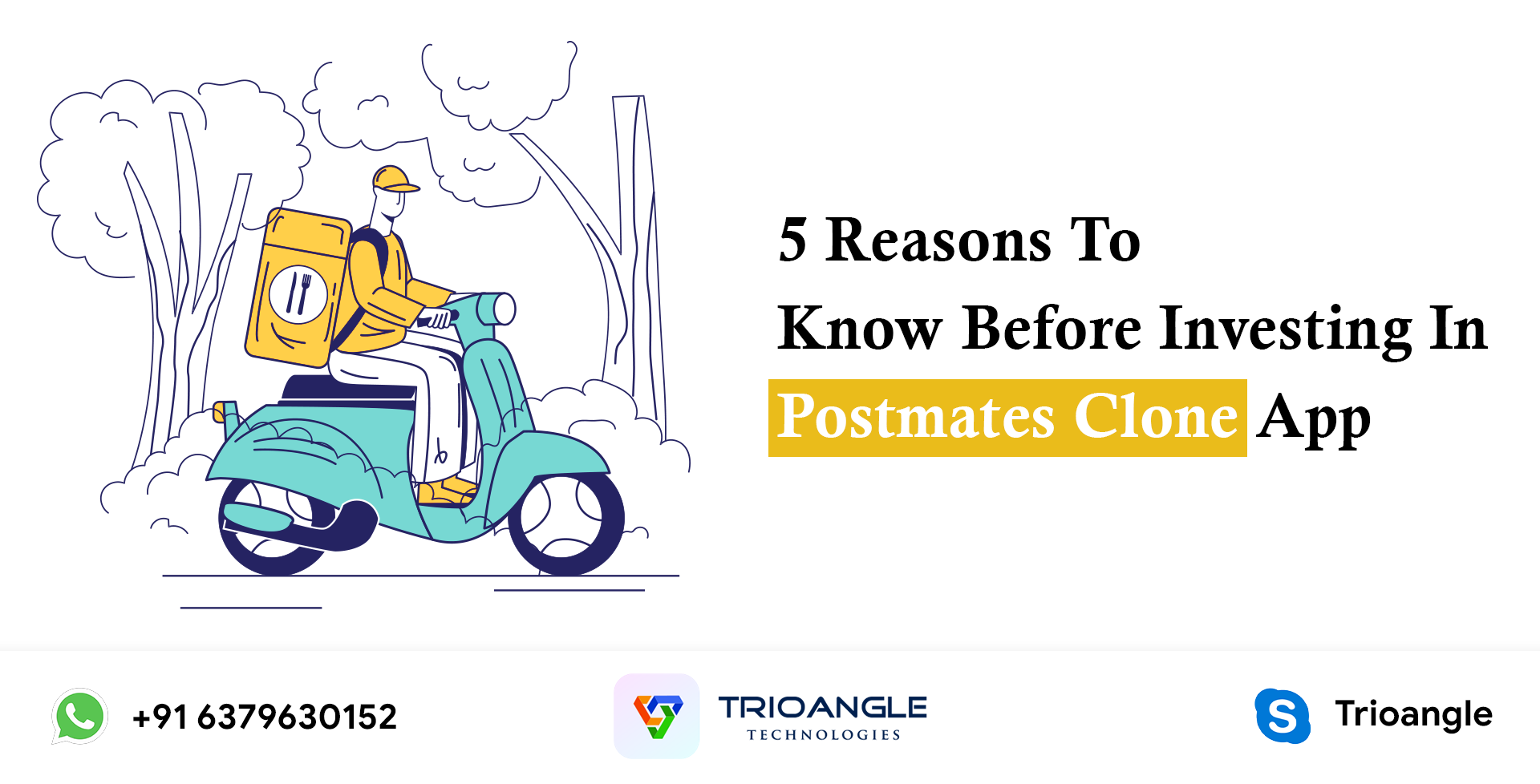In today’s fast-paced world, convenience is the key to staying ahead in any industry. One sector that has observed an exceptional transformation in recent years is the grocery retail industry, driven by the emergence of on-demand grocery delivery mobile apps.
These digital platforms have revolutionized the way people shop for groceries, offering unparalleled ease and efficiency. With just a few taps on a smartphone, customers can now have their groceries delivered right to their doorstep, eliminating the need for time-consuming visits to the grocery store.
This expedient in consumer behavior presents a substantial opportunity for grocery store owners and businesses to embrace an on-demand grocery delivery script to enhance their business operations and expand their reach.
In this blog, let’s delve into the numerous benefits that an on-demand grocery delivery app brings to businesses within the grocery retail sector.
Key Objectives of Developing an On-Demand Grocery Delivery App for Your Business:
Developing a grocery app for your business is a strategic move that can significantly enhance your business operations, customer engagement, and overall revenue.
Here are the key objectives of on-demand grocery delivery app development that can benefit your business:
The Grocery Delivery App Establishes a Strong Brand Presence
Creating a recognizable brand is a vital aspect of business success. On-demand grocery app development can shatter geographical barriers, paving the way for global expansion. This expansion enables your grocery venture to establish itself as a trustworthy and reliable brand.
Trust is a cornerstone of successful businesses and an Uber-like grocery delivery app significantly contributes to building this trust among your customers. The impact of an Uber-like grocery delivery app on your customers is profound and long-lasting.
Features such as 24/7 availability, push notifications, and customer reviews are key components of an on-demand grocery delivery app. These features help in fostering a strong rapport with your customer base.
Ultimately, the app sets your business apart from others in the market, leading to heightened customer engagement and brand building.
Data Collection
An invaluable advantage of a grocery delivery app like Uber is the ability to gather and analyze customer data. This data allow businesses to understand their customer’s shopping behaviors and evolving preferences, enabling improvements in services and driving sales.
In today’s digital age, mobile shopping is a popular choice, underlining the growing significance of grocery delivery mobile apps. These apps effectively capture crucial customer data, such as preferred products, frequently used payment methods, and more.
Analyzing this data provides valuable insights into customer expectations and preferences. Equipped with these insights, businesses can make informed decisions to enhance their offerings and tailor services to meet specific customer needs.
Attracting Customers
According to Statista, online grocery sales are anticipated to reach $75 billion by the end of 2023. To capitalize on the growing trend of online grocery shopping, developing a grocery app with essential features is crucial.
This not only ensures convenience and a secure shopping environment for customers but also offers an exceptional shopping experience.
The Uber clone app for grocery eliminates the need for customers to physically visit the grocery stores and endure long checkout queues. With on-demand grocery delivery, customers can have their groceries delivered right to their doorstep, all while they’re on the move.
This convenience significantly boosts sales for your grocery store, attracting more customers to engage with your business.
Managing Loyalty Program
One significant advantage of having a grocery delivery app like Uber for Grocery is the inclusion of a loyalty program. Customers genuinely appreciate this initiative, and it serves as a means to cultivate loyal customers, a valuable asset for your business.
Unlike traditional physical grocery stores, the app’s loyalty program encourages customers to use the app more frequently.
Furthermore, the app efficiently handles the management of this loyalty program. It actively notifies users about their earned reward points and informs them about various promotional schemes through push notifications.
This proactive approach effectively sustains people’s interest and engagement with your business, showcasing how easily you can administer the loyalty program through the Uber clone app for Grocery.
How Does an On-Demand Grocery Delivery App Overcome Grocery Store Challenges?
It’s crucial to emphasize that grocery delivery app development can prepare your business to navigate various challenges and face escalating competition.
Here are the primary challenges your grocery store can effectively tackle with a grocery delivery app like UberEats for Grocery:
Addressing Perishability
Running a successful grocery store presents various challenges, notably concerning perishable items like fruits, milk, and vegetables, which require ample space and specific infrastructure. The demand fluctuations for these items can significantly impact operational costs.
The Uber for Grocery-like app offers a solution by allowing grocery stores to focus on timely delivery and efficient online services, reducing the pressure on in-store storage.
Customers tend to place orders more frequently when they receive fresh products at their doorsteps. This boosts business turnover and optimizes the supply chain.
Moreover, a grocery app minimizes the risk of wrong product deliveries, enhancing customer trust and satisfaction.
Mitigating Thin Profit Margins
Thin profit margins pose another obstacle in the grocery retail landscape. Customers today seek the best deals for every purchase, including groceries, making it challenging for retailers to maintain profitability.
However, the Uber clone app for Grocery provides a platform for retailers to sell a variety of products, including food items and medicines, consolidating sales and countering thin profit margins.
Adapting to Customer Behavior
Adapting to the evolving expectations and habits of customers is an ongoing challenge for grocery store owners and businesses.
Understanding customer behaviors and preferences is crucial, as failing to do so can lead to overstocking or stock shortages, resulting in significant losses.
The Uber-like grocery app addresses this challenge by capturing and analyzing user behavioral data, empowering retailers and businesses to make informed decisions and optimize their demand and supply chain.
Final Thoughts
Incorporating an on-demand grocery delivery app into your business model is a strategic move that can propel your grocery retail business to new heights.
The multitude of benefits outlined in this blog, position the grocery delivery mobile app as a vital tool for modern grocery retailers.
Embrace the future of grocery shopping with an on-demand grocery delivery app, and witness the transformative impact on your business.



